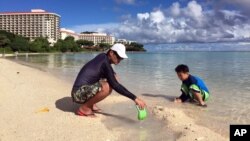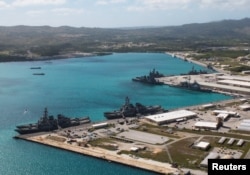Tourists haven't been deterred from visiting the tropical island of Guam even though the U.S. territory has been the target of threats from North Korea during a week of angry words exchanged by Pyongyang and Washington.
Chiho Tsuchiya of Japan heard the news, but she decided to come anyway with her husband and two children. “I feel Japan and Korea also can get danger from North Korea, so staying home is the same,” said the 40-year-old.
Won Hyung-jin, an official from Modetour, a large South Korean travel agency, said several customers called with concerns, but they weren't worried enough to pay cancellation fees for their trips.
“It seems North Korea racks up tension once or twice every year, and travelers have become insensitive about it,” Won said. His company has sent about 5,000 travelers to Guam a month this year, mostly on package tours.
The U.S. territory has a population of 160,000, but it attracted 1.5 million visitors last year. One-third of Guam's jobs are in the tourism industry.
Guam is a key outpost for the U.S. military, which uses it as a base for bombers and submarines.
The island's sandy beaches and aquamarine waters make it a popular getaway for travelers from Japan and South Korea. Guam is only about three hours by plane from major cities in both countries.
The number of South Korean travelers in particular has been growing lately because five low-cost airlines started flying to Guam from South Korea, said Antonio Muna, the vice president of Guam Visitors Bureau. This helped boost arrival figures to a 20-year high in July, Muna said.
The threats came in a week in which longstanding tensions between the countries risked abruptly boiling over. New United Nations sanctions condemning the North's rapidly developing nuclear program drew fresh ire and threats from Pyongyang. President Donald Trump responded by vowing to rain down “fire and fury” if challenged. The North then threatened to lob missiles near Guam.
Kenji Kikuchi, 39, arrived from Japan last week and planned to leave Tuesday as scheduled. He was aware of the threat from reading the local newspaper and was a little worried. But he said North Korea's missiles would fall in the water not on Guam. His 8-year-old son and 4-year-old daughter weren't concerned.
“They talk about it, but they don't care about it. So they like the sea and the pool,” he said.
The Guam Visitors Bureau has heard reports of cancellations, but Muna said it doesn't yet have any concrete figures on how many took place. Officials are still expecting a strong August, Muna said.
“Japan and Korea make over 90 percent of our arrivals. And they're much closer to North Korea than Guam is,” Muna said.
The agency has been relaying assurances from the governor and defense officials that Guam is protected and safe, he said.
Trump told Guam's Republican governor the global attention would send more tourists to the island.
“You're going to go up like tenfold with the expenditure of no money,” he told Gov. Eddie Calvo in a telephone conversation Calvo posted Sunday on Facebook. Trump said he'd been watching scenes of Guam on the news, and “it just looks like a beautiful place.”
At a news conference Monday, Calvo said that Guam is in a “normal state of readiness and it's business as usual.”
There is “no change in security threat levels.”
He told the reporters that “we are defended and will be protected.”





